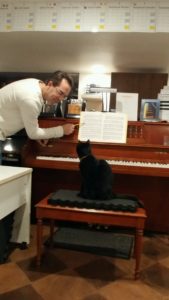 Musicianship: I strive to turn my students into musicians, not just pianists. They undergo collegiate rhythmic training and collegiate theory after three years of lessons since there is no good reason to wait until college. It isn’t enough to teach good musical values – students must also learn to experiment and be inventive in their music making. Ultimately, I want them to become lifelong independent music learners. Developing independence in students is only possible when the teacher generously shares the “why” (not just the “what”) of all musical decisions with the student.
Musicianship: I strive to turn my students into musicians, not just pianists. They undergo collegiate rhythmic training and collegiate theory after three years of lessons since there is no good reason to wait until college. It isn’t enough to teach good musical values – students must also learn to experiment and be inventive in their music making. Ultimately, I want them to become lifelong independent music learners. Developing independence in students is only possible when the teacher generously shares the “why” (not just the “what”) of all musical decisions with the student.
Flexibility: I adapt my teaching to the student. While all are taught core curriculum, students are encouraged to find “dessert music,” whether it be music from Harry Potter, Coldplay, ballet transcriptions or video game music (all of which – and much more – has been featured in my studio recitals).
Gentle Honesty: I seek to be both positive and honest in my interactions with students. There is always a nice way to speak honest criticism, and it is my goal to always find these words so that students will not only like me, but will also always seek and trust my professional opinion.
Transparency: I keep parents and students well-informed. Parents are invited to observe lessons. Parents are one of the best facilitators for productive practice each week if they know what is going on in each lesson, even if they don’t know anything about music.
Serious Levity: I am a serious teacher who loves to joke around. When students complete pieces, I fasten stickers on their music that range from broccoli to “Intel Inside!” stickers since gold stars are boring. I love it when students scoot across the bench playing scales, because then I get to write “no scooting butt” in their notebook after telling them that my piano bench doesn’t need additional polishing. When students hit wrong notes or write wrong notes in their theory books, they are complimented on discovering revolutionary new chords and scales. While seriousness is important, I believe that a certain amount of levity is critical in a healthy learning environment.
Slogan: I regularly tell my students that there is no such thing as too hard; there is only too fast or too much. They also frequently hear that practice does not necessarily make perfect; practice only makes permanent. Some students can do more with 30 minutes of practicing per week than others do with 30 minutes per day, and it all boils down to how efficient their practicing is. Do they sit down and play piano each day, making little or no changes in their playing, sacrificing long-term fun/progress for short-term fun, or do they actually practice the piano? Preparing students for efficient practicing at home is the goal that I am probably most obsessively focused on in every lesson. It does no good to point out loose screws if the student does not yet own a screwdriver.